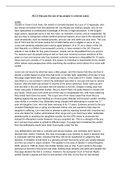AC2.5 Discuss the use of lay people in criminal cases
Juries
Usually in Crown Court trials, the verdict is normally decided by a jury of 12 laypeople, who
are chosen at random from the electoral roll. Lay People are ordinary people, who do not
have specialised or professional knowledge of the law or legal procedure. In the English
legal system, laypeople serve in two key roles: as members of juries, and as magistrates. By
law jury duty is compulsory unless extreme personal reasons occur due to the importance of
court procedures, such as medical grounds, and you can only defer jury duty once. The Jury
Act of 1974 and the Criminal Justice Act of 2003 define who is eligible to serve on jury.
Jurors are randomly selected and must be aged between 18 to 75, be a citizen of the UK,
Irish Republic or a British Commonwealth country, or have resided in the UK, Channel
Islands or Isle of Man for five years.However, people can be disqualified from jury service.
For reasons such as people being on bail or have ever received a prison sentence of five
years or more and anyone who has received a shorter sentence is disqualified for 10 years.
Since each jury consists of 12 people, this means no individual is responsible for the verdict
which allows more perspectives when examining the evidence which allows for a more safe
verdict.
Jurors are not bound by what law says, unlike judges, and this means that they are free to
decide a verdict based on what they feel is fair or morally right, regardless of the law or how
the judge might direct them. This is called jury equity. In the case of R V Owen, Owen’s son
was killed in a car accident in which the defendant was blind in one eye and had no drivers
licence. After the killer had served 12 months of his prison sentence, Owen went out and
shot the killer in the arm and back with the intention to kill him. Despite it being clear that
Owen was guilty of attempted murder, the jury found Owen not guilty based on morals and
jury equity. Some jurys even went out of their way to congratulate him, with many believing
they would have done the same. This is just one of the many cases that show the jury
fighting against the law and handing an obvious guilty offender and innocent verdict. Another
case similar is a mother, Kay Gilderdale being charged with attempting to murder her 31
year old daughter Lynn, who had been seriously ill for 17 years. Evidence proved to the jury
revealed Gilderdale was a caring and devoted mother who just wanted to help stop her
daughter's suffering. Lynn had tried to attempt sucide by injecting herself with morphine but
once she failed her mother administered other drugs and Lynn died hours later. Gilderdale
pleaded guilty to assisting her daughters suicide, but the CPS chose to prosecute her
instead for attempted murder However, the jury acquiited her. This is a strength of the jury
as it conveys how justice is upheld in different ways: if a judge had considered the verdict
then the defendants would have been found guilty under the law.
Jury deliberations are held in a private and secure location, and members don’t have to
disclose their verdict. However, this may encourage a jury member to reach a decision that
is unpopular with the public, knowing that they will not be questioned or judged by their
decision. A limitation is that there is a growing concern that some jurors are racially biassed
and this can result in unjust verdicts. This applies to the case of Sander v United Kingdom
2000, where in 1995 an Asian man Kuldip Sander was on trial. A juror wrote to the judge
pointing out that two of the jurors had been making racist remarks and jokes and despite this
the judge allowed the trial to continue. However, the European Court of Human Rights
upheld Sander’s appeal and that he was denied a fair trial, but by then he had already





